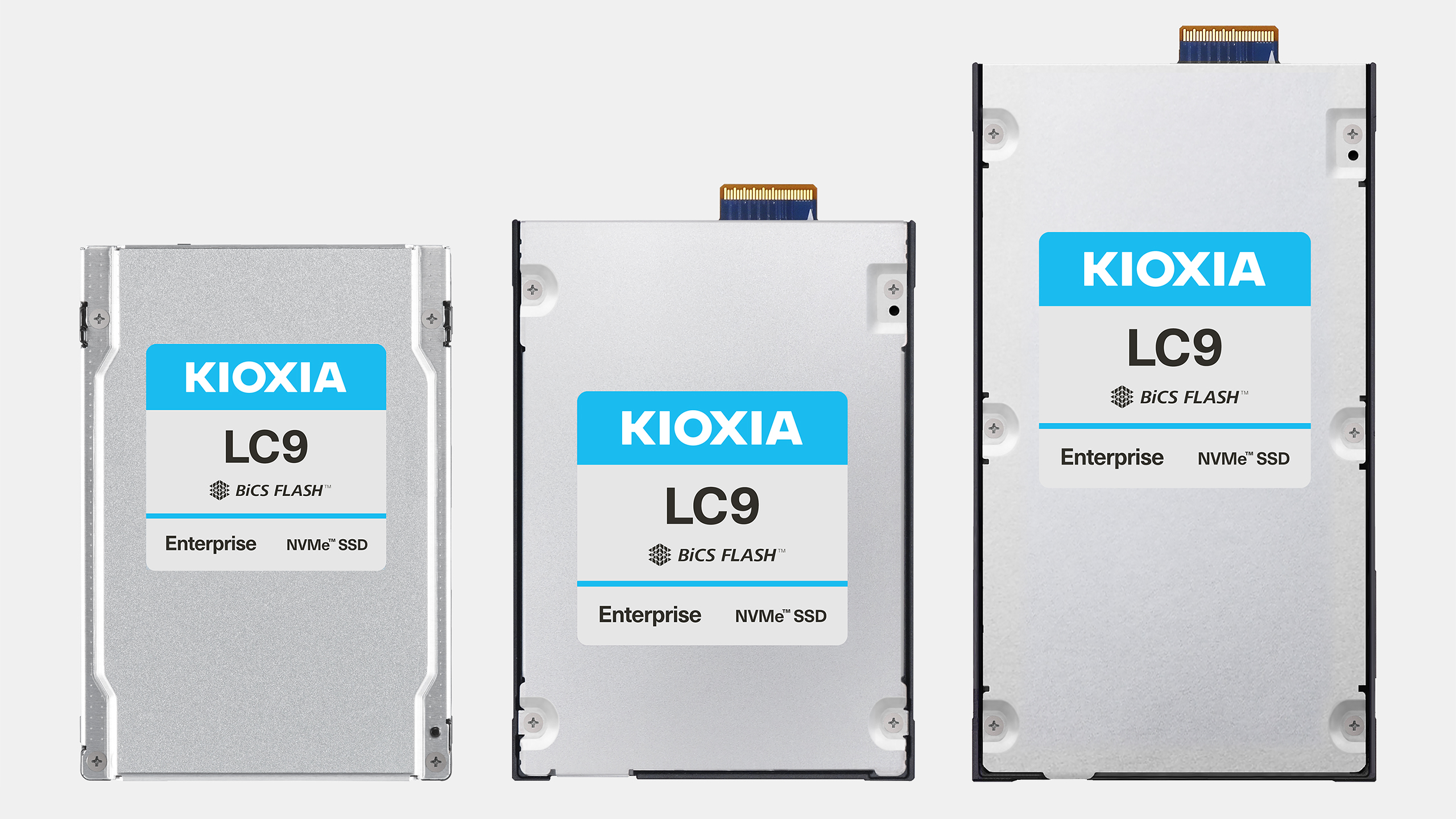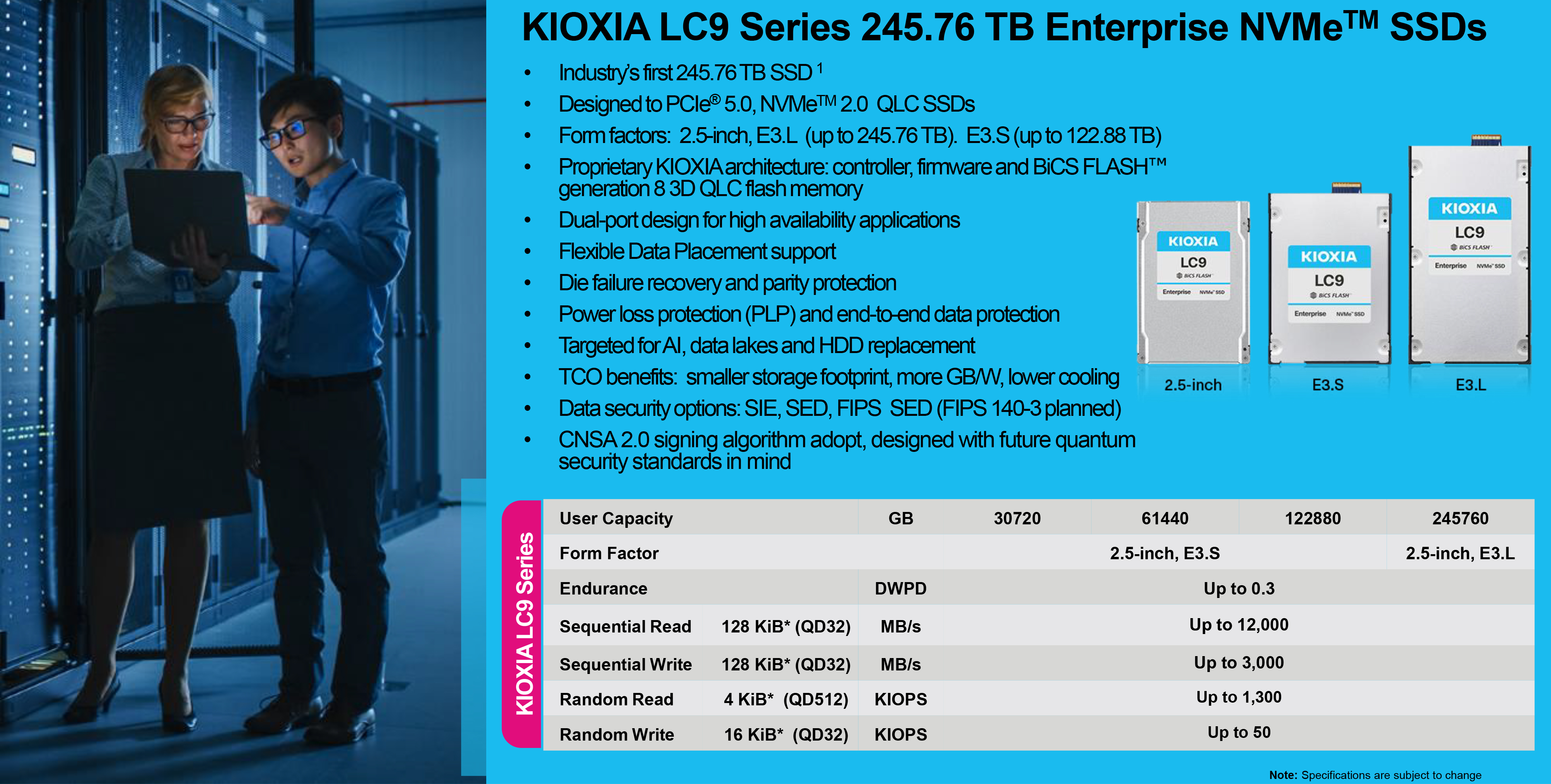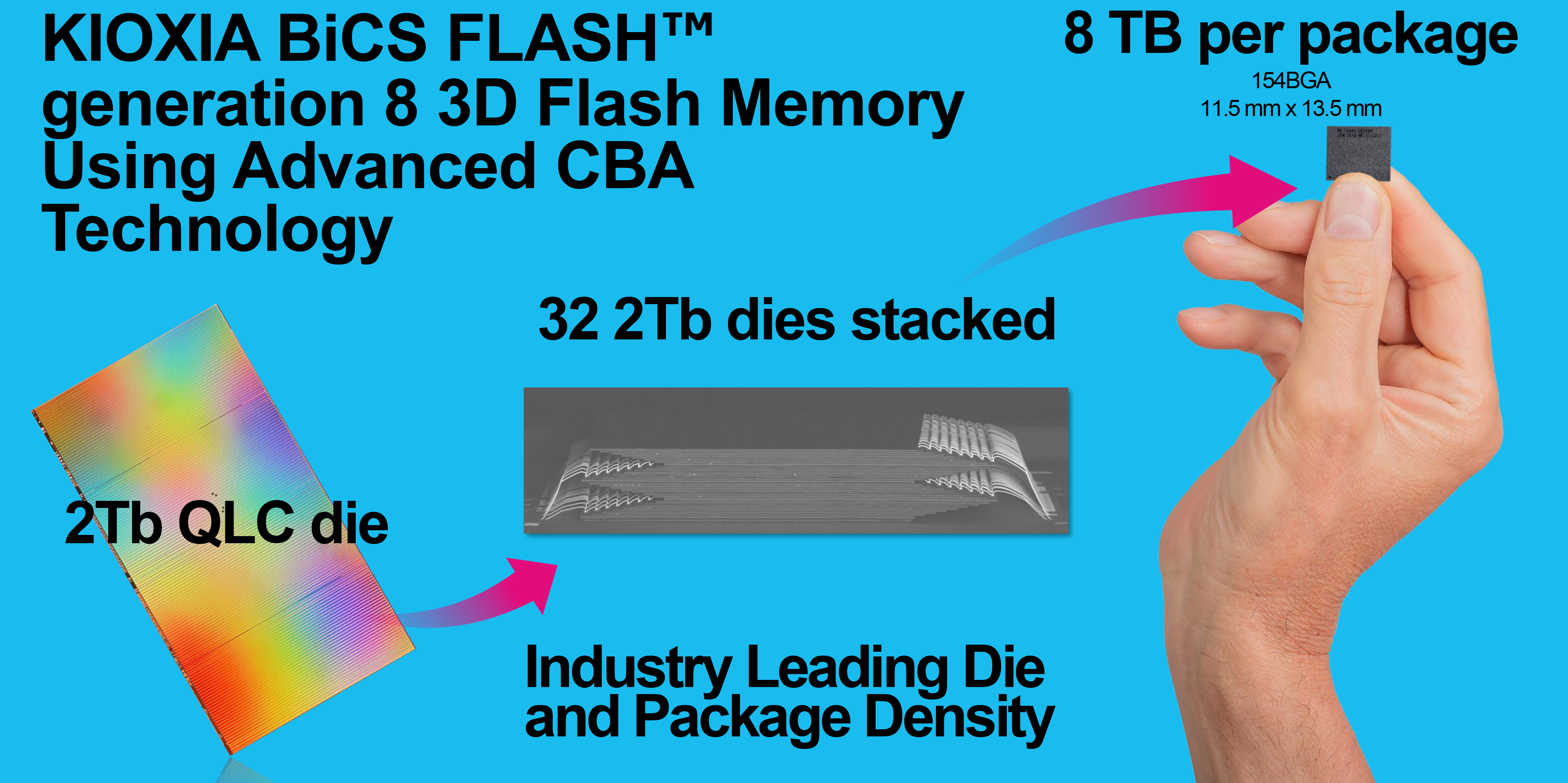Kioxia unveils 245TB SSD, the world's highest capacity storage device - can store 12,500 4K movies
Targets AI and hyperscalers.

Kioxia has introduced a solid-state drive with an unprecedented storage capacity of 245.76TB, currently the highest-capacity storage device available. The company positions its LC9 drive for applications that benefit from maximum storage density, such as AI training and hyperscale workloads. Remarkably, the company has managed to cram 8TB of storage capacity into a single NAND package —a record that enables the construction of such a hefty SSD using multiple ultra-high-capacity packages. To give some perspective on the sheer amount of storage, assuming a heavily compressed 20GB size for a 4K movie, the Kioxia drive could store an astounding 12,500 movies per device.
The Kioxia LC9 is based on an unknown proprietary NVMe 2.0-compliant controller with a PCIe 5.0 x4 interface (with dual-port capability) as well as Kioxia's BiCS8 2Tb 3D QLC NAND memory devices. To enable a 245.76TB capacity in an E3.L form-factor, Kioxia had to package 32 memory devices into a single chip (8TB of storage space) and then attach those chips to the controller. This packaging sets a new record for density and uses the company's proprietary methods for wafer processing and assembly, according to Kioxia.
Performance-wise, the drive delivers sequential read speeds of up to 12 GB/s and write speeds of up to 3 GB/s. This isn't the highest performance for an enterprise PCIe 5.0 SSD, but there's an obvious tradeoff between capacity and performance. At the end of the day, ensuring signal integrity in a 32-Hi 3D NAND package is a big deal, so it is not surprising that it is achieved by sacrificing interface speed.
For random operations, the SSD achieves up to 1.3 million IOPS for reads and 50,000 IOPS for writes, which is again not particularly impressive, but the LC9 is clearly designed for capacity rather than performance.
As for endurance, the Kioxia L9 drives are rated at 0.3 drive writes per day (DWPD), which again reflects a balance between capacity and longevity for data center usage patterns.
The product incorporates multiple features to improve reliability and protect data, including die-level recovery, parity-based error management, and safeguards against sudden power loss. It also includes support for Flexible Data Placement, which reduces internal write amplification and extends the usable lifespan, especially in database-driven applications.
Security options include encryption and firmware signing compliant with CNSA 2.0 standards. The drive supports multiple encryption modes, including AES-256 encryption and algorithms prepared for post-quantum cryptography.
Get Tom's Hardware's best news and in-depth reviews, straight to your inbox.
Kioxia plans to offer its L9 drives in multiple form factors, including a 2.5-inch U.2 (up to 122.88TB), E3.S (up to 122.88TB), and E.3L (up to 245.76TB). The company did not disclose pricing of these drives as they will be sold primarily to large hyperscale data center companies, and exact quotes will depend on volumes and other factors.
The LC9 series is currently being sampled to select partners and will be featured at the Future of Memory and Storage conference in August 2025.
Follow Tom's Hardware on Google News to get our up-to-date news, analysis, and reviews in your feeds. Make sure to click the Follow button.

Anton Shilov is a contributing writer at Tom’s Hardware. Over the past couple of decades, he has covered everything from CPUs and GPUs to supercomputers and from modern process technologies and latest fab tools to high-tech industry trends.
-
ravewulf As nice as all that storage space may be, it'd be nicer if we could get some 8TB SSDs that are affordable...Reply -
Li Ken-un Reply245TB SSD, the world's highest capacity storage device - could store 12,500 4K movies
How many bananas does that store? -
tamalero Reply
This, Id rather have tons of capacity at modest speeds. Than having the "lol ultra duper super manga banga Xtra GTO edition" fast NVME with still a weak sauce 2TB capacity.ravewulf said:As nice as all that storage space may be, it'd be nicer if we could get some 8TB SSDs that are affordable...
But I guess manufacturers are only going for the same thing as the cpus underwent for "lol faster.." -
Hasselblad Replyravewulf said:As nice as all that storage space may be, it'd be nicer if we could get some 8TB SSDs that are affordable...
My son has this, affordability is a subjective thing, some spend £15 a day smoking, some drink, some gamble
https://www.amazon.co.uk/WD_BLACK-SN850X-Expansion-Performance-Internal/dp/B0D9WT512W/ref=sr_1_4?dib=eyJ2IjoiMSJ9.OHSxW-m7Tf5TZ5aUS3d4sNTatL5WzVb9PFYvsg_BT5ob-3nKMiWLoX388fUWAnuFAsqu6eoEjiGk_rt3iIQLLTJYPD2SgdGUaH3WiXcxInPxaN0stFzM-2-edJTkR_qemTZ-DncDD8sooeSOLzT1pUsUpIRY-rF97pv2Ad_ei1PPOa0azcVkQpYX1EUXQpMyb9AZtEJFBizihih9WvG0lsFkY-oB4U4IiqeRWVtGbY4._m5Nvlx5H4GX3lB4azdghtZ_dJ78Jh4ttrnJCpautCA&dib_tag=se&keywords=ssd%2B8tb&qid=1753185036&sr=8-4&th=1 -
Hasselblad ReplyPaineful said:Oh no, it broke. Now I have to download those 12,500 OnlyFanz gals again!
people have been saying that since the 540 MB hard drive replaced the 450MB, -
bit_user Reply
The obvious implication would seem to be that we can expect 16 TB single-sided QLC M.2 drives, in the near future? Or are these 8 TB packages too expensive for such a product? Either way, I wouldn't be surprised if it's only PCIe 4.0, given the performance numbers quoted for the much greater numbers of packages crammed into those enterprise enclosures.The article said:Remarkably, the company has managed to cram 8TB of storage capacity into a single NAND package -
bit_user Reply
I'm sure they're well aware of the demand for more (affordable) capacity, but it seems that space increases are much more expensive than speed increases, right now.tamalero said:This, Id rather have tons of capacity at modest speeds. Than having the "lol ultra duper super manga banga Xtra GTO edition" fast NVME with still a weak sauce 2TB capacity.
But I guess manufacturers are only going for the same thing as the cpus underwent for "lol faster.."
Like I said above, these 8 TB packages should mean 16 TB drives, if such a product can be made affordable. On the flip side, they ought to be able to use the same dies & packaging technology to make 4 TB packages, for cheaper 8 TB drives. -
ravewulf Reply
The goal would be $0.05/GB at most, so $400 or less. Currently it's $600.Hasselblad said:My son has this, affordability is a subjective thing, some spend £15 a day smoking, some drink, some gamble
https://www.amazon.co.uk/WD_BLACK-SN850X-Expansion-Performance-Internal/dp/B0D9WT512W/ref=sr_1_4?dib=eyJ2IjoiMSJ9.OHSxW-m7Tf5TZ5aUS3d4sNTatL5WzVb9PFYvsg_BT5ob-3nKMiWLoX388fUWAnuFAsqu6eoEjiGk_rt3iIQLLTJYPD2SgdGUaH3WiXcxInPxaN0stFzM-2-edJTkR_qemTZ-DncDD8sooeSOLzT1pUsUpIRY-rF97pv2Ad_ei1PPOa0azcVkQpYX1EUXQpMyb9AZtEJFBizihih9WvG0lsFkY-oB4U4IiqeRWVtGbY4._m5Nvlx5H4GX3lB4azdghtZ_dJ78Jh4ttrnJCpautCA&dib_tag=se&keywords=ssd+8tb&qid=1753185036&sr=8-4&th=1
Ideally, I'd like it to be around $350 or less for a cheap/slow model. Even an 8TB 2.5" SATA SSD around that price would be fine, but the 8TB Samsung QVO is selling for practically double that at almost $700. Insane price considering the SN850X is cheaper and is a PCIe 4.0 NVMe drive. -
snemarch Reply
Yeah, it's a damn shame that it seems capacity itself is what drives price – I wouldn't mind SATA max bandwidth, if I could get low latency, low cost and high reliability.ravewulf said:Ideally, I'd like it to be around $350 or less for a cheap/slow model. Even an 8TB 2.5" SATA SSD around that price would be fine, but the 8TB Samsung QVO is selling for practically double that at almost $700. Insane price considering the SN850X is cheaper and is a PCIe 4.0 NVMe drive.

